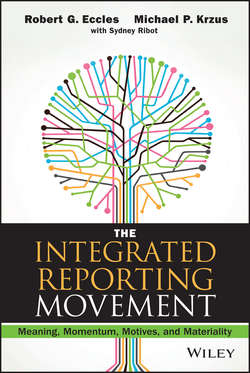Читать книгу The Integrated Reporting Movement - Eccles Robert G. - Страница 4
На сайте Литреса книга снята с продажи.
Foreword
ОглавлениеTrue leaders aim to take people to a place they have never been, and they have a plan to get them there.
For those among us who dream of leading our companies toward economic, environmental, and social sustainability, “integrated reporting” is a key part of the plan to get us where we need to go.
This is why Robert Eccles's and Mike Krzus's The Integrated Reporting Movement is such an important book; it arms today's leaders with reasons to continue the movement's momentum.
More than a trend, a public relations (PR) incentive, or just “the right thing to do,” sustainability is about growth and innovation. It's about winning the war for talent and winning in the marketplace. It recognizes that, today, people care as much about a company's purpose, values, and global impact as they do about its products, packaging, and prices. Integrated reporting is a big idea because, as a methodology, it helps create the strategies, the business models, the cultures, and the thinking that lead to a more sustainable business – and a more sustainable world.
From my own front-row seat as a chief executive officer (CEO), I've been a proud champion of the movement that Professor Eccles and Mike Krzus so thoroughly describe and enthusiastically support. SAP is a global technology company with 66,000 employees and more than 260,000 customers. As we went from having a stand-alone sustainability strategy to creating a corporate strategy that is sustainable (a huge difference), we began presenting our financial and nonfinancial results in a single report. This bold shift is helping us achieve several goals:
First, it enhances transparency and accountability at a time when customers, shareholders, and business partners are demanding more of each.
Second, it allows us to more fully live up to SAP's core vision – to help the world run better and improve people's lives – as well as fulfill our responsibilities as a global corporation by ensuring we substantially address serious issues, such as the threat of climate change.
Third, it lets us tell one, more unified story.
Fourth, integrated reporting helps tackle another big, budding movement: the desire to run simple.
One of the most intractable problems of our time, especially for CEOs, is complexity. I hear it every day. Businesses large and small are under siege. The demand for more insight into how companies do business is overwhelming. Meanwhile, doing business is more complicated than ever due to the explosion of data, multiple channels of communication, paralyzing layers of management, and the choke of sprawling technical infrastructures. Amid all this complexity is a craving to simplify everything.
When it comes to sustainability, one choice is simple: Combining financial and nonfinancial reporting in one place beats back complexity by reducing redundancy and increasing efficiency. In today's economy, less means more.
Integrated reporting also unleashes a new competitive advantage. No company can help its customers navigate the changing world unless it does so itself. Early adopters of integrated reporting are better positioned to serve their clients than those that ignore or resist the movement. At SAP, lessons learned as we go down this path combine with the power of information technology to help our customers track their own energy consumption and greenhouse gas emissions as SAP does – companywide, averaged per employee – as well as begin to link that data to revenue and profit margins.
In that way, sustainability is not solely about reporting. More exciting is the fact that economic, environmental, and social actions are linked, and their connections have the potential to create amazing value. The challenge for today's leaders is not just to operate, but to innovate by identifying how actions in one area can affect another.
At SAP, we believe that social investing – employee volunteering, financial gifts, technology donations – links to greater employee engagement, productivity, and the ability to acquire new customers, especially in emerging markets. Reducing our greenhouse gas footprint with renewable energy sources or reducing our employees' travel, for instance, is not only good for the environment: we believe it can positively affect our people's overall health, our ranking as a top employer, and our customers' loyalty, as well as grow revenue as more companies require this of their suppliers.
Looking ahead, the integrated reporting movement is poised to speed up, fueled by innovation. It will be easier to execute and embrace as cloud computing, analytics, and in-memory technologies simplify companies' ability to track, assess, compare, and share data. As always, the best companies will change before they absolutely have to.
I've always believed that the only way to achieve audacious outcomes is to set audacious goals. And audacity is at the heart of sustainability. As leaders, we are our records. Our leadership will be defined by the people we touch and what we leave behind. So as you read this important book, reflect on what it means for your legacy, your people, your company, and our world.
Bill McDermott,
Chief Executive Officer, SAP
